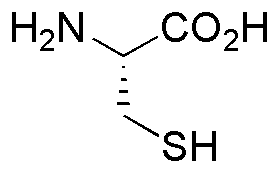L-Cysteine from non-animal source is widely utilized in research focused on:
- Food Industry: It serves as a food additive and antioxidant, enhancing the shelf life and quality of baked goods and processed foods.
- Pharmaceuticals: Used in the formulation of various medications, it acts as a mucolytic agent to help break down mucus in respiratory conditions.
- Cosmetics: Its properties make it a popular ingredient in skincare products, promoting skin health and acting as a moisturizer and antioxidant.
- Biotechnology: In cell culture, it supports cell growth and stability, making it essential for producing proteins and other biological materials.
- Research Applications: Commonly used in laboratories for studying protein structure and function, it aids in understanding cellular processes and enzyme activity.
General Information
Properties
Safety and Regulations
Applications
L-Cysteine from non-animal source is widely utilized in research focused on:
- Food Industry: It serves as a food additive and antioxidant, enhancing the shelf life and quality of baked goods and processed foods.
- Pharmaceuticals: Used in the formulation of various medications, it acts as a mucolytic agent to help break down mucus in respiratory conditions.
- Cosmetics: Its properties make it a popular ingredient in skincare products, promoting skin health and acting as a moisturizer and antioxidant.
- Biotechnology: In cell culture, it supports cell growth and stability, making it essential for producing proteins and other biological materials.
- Research Applications: Commonly used in laboratories for studying protein structure and function, it aids in understanding cellular processes and enzyme activity.
Documents
Safety Data Sheets (SDS)
The SDS provides comprehensive safety information on handling, storage, and disposal of the product.
Product Specification (PS)
The PS provides a comprehensive breakdown of the product’s properties, including chemical composition, physical state, purity, and storage requirements. It also details acceptable quality ranges and the product's intended applications.
Certificates of Analysis (COA)
Search for Certificates of Analysis (COA) by entering the products Lot Number. Lot and Batch Numbers can be found on a product’s label following the words ‘Lot’ or ‘Batch’.
Número de catálogo
Número de lote/lote
Certificates Of Origin (COO)
This COO confirms the country where the product was manufactured, and also details the materials and components used in it and whether it is derived from natural, synthetic, or other specific sources. This certificate may be required for customs, trade, and regulatory compliance.
Número de catálogo
Número de lote/lote
Safety Data Sheets (SDS)
The SDS provides comprehensive safety information on handling, storage, and disposal of the product.
DownloadProduct Specification (PS)
The PS provides a comprehensive breakdown of the product’s properties, including chemical composition, physical state, purity, and storage requirements. It also details acceptable quality ranges and the product's intended applications.
DownloadCertificates of Analysis (COA)
Search for Certificates of Analysis (COA) by entering the products Lot Number. Lot and Batch Numbers can be found on a product’s label following the words ‘Lot’ or ‘Batch’.
Número de catálogo
Número de lote/lote
Certificates Of Origin (COO)
This COO confirms the country where the product was manufactured, and also details the materials and components used in it and whether it is derived from natural, synthetic, or other specific sources. This certificate may be required for customs, trade, and regulatory compliance.


